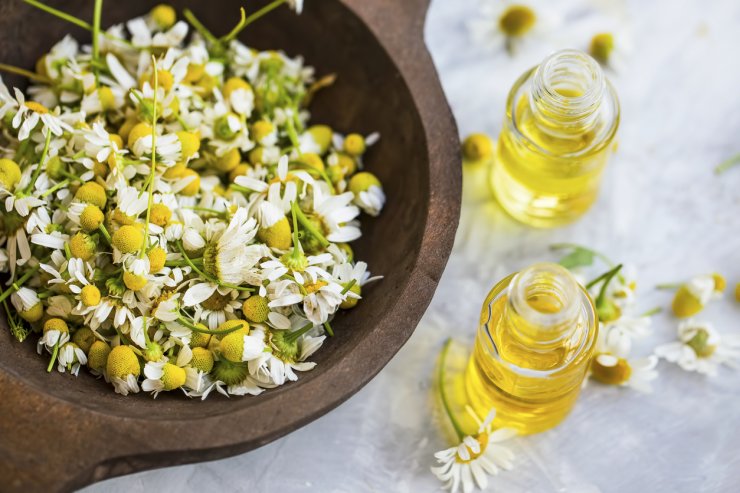
Home remedies using chamomile

Home remedies using chamomile
Chamomile’s reputation for easing what ails you goes back thousands of years. In the Middle Ages, people used chamomile to treat asthma, colic, fever, inflammation, nausea, anxiety, skin diseases, and even cancer.
Chamomile’s beneficial properties come from its flowers, which contain several volatile oils, including bisabolol, bisabolol oxides A and B, and matricin. The flowers also contain antioxidant flavonoids, including a compound called apigenin. Chamomile may be used internally or externally. It’s most commonly found as tea, but there are also essential oils available, which people use to treat anxiety, injury, and infection. Chamomile is also used in cosmetics, soaps, and skin creams.
Take note that not all modern doctors agree on the effectiveness of chamomile for alleviating the discomfort of various ailments. But studies in recent years have validated many of the folk remedy uses of chamomile. That being said, let’s see how chamomile may be able to help us.
First off, we need to point out that some people may be allergic to chamomile and not know it. If you have ever had an allergic reaction to chamomile, you should avoid it; allergic reactions can get worse with increased exposure.
Also, people with pollen allergies should exercise caution. We do, after all, use the blossom of the plant to make the tea; it contains pollen and could conceivably contain pollen from other plants—you’ve seen the bees going from flower to flower.
Finally, infants and young children should not consume chamomile products. Just as with honey, chamomile could be contaminated with botulism spores. Adults can fight off an infection, but it could be a serious situation for young children, and especially infants.
If you are taking any medications, you should double check with your doctor to make sure chamomile won’t cause an interaction with your medication.
Never use chamomile (or any herb) as a replacement for medicine your doctor has prescribed for you.
Sipping for Sleep
Probably chamomile’s biggest claim to fame is its usefulness in helping people relax and fall asleep. Many of the claims appear to be anecdotal—and yet chamomile is now included in the lists of medicinal drugs in more than two dozen countries. Either way, that doesn’t keep people from brewing a hot cup of chamomile tea before bed or when they’re feeling particularly tense.
Better Bones?
The older we get, the more we’re at risk for osteoporosis—a progressive loss of bone density. While osteoporosis can affect anyone, it’s most common among post-menopausal women due to an estrogen imbalance. One study found that chamomile may work against the effects of estrogen.
Diabetes and Low Blood Sugar
Chamomile tea isn’t a viable replacement for diabetes medications, but some studies have shown that chamomile tea can lower the blood sugar of some people with diabetes. Another study indicates that chamomile tea may help prevent blood sugar from increasing. There’s still much research to be done, and it’s worth following if you have diabetes or are at risk of developing it.
Digestive Health
Chamomile has a reputation for soothing upset stomachs. Chamomile contains chemical compounds that may reduce inflammation, making it helpful for stomach and intestinal upset.
Skin Health
One study found that applying chamomile extract to wounds helped them heal. Ointments made with chamomile have reportedly been helpful in relieving the discomfort of skin conditions such as eczema, although they were not as effective as hydrocortisone cream.
Women’s Health
Several studies have linked the consumption of chamomile tea to relief of menstrual cramps in women. One study found that drinking chamomile tea for a month reduced the onset of cramps.
In the early 17th century, English herbalist and barber-surgeon (that’s where the red and while spinning poles come from) John Gerard published a book entitled Gerard’s Herbal. In it, Gerard said that chamomile was used in the birthing process: a woman who had just given birth would drink a mixture of white wine and chamomile to help with the expulsion of the afterbirth.
Bottom Line
Researchers still aren’t sure exactly what it is about chamomile that makes it so beneficial in so many situations, but studies are increasingly confirming more of the plant’s reputed benefits. A lot of people are less anxious and getting more and better sleep after sipping a hot cup of chamomile tea.
Did you know that chamomile can be so beneficial? Please tell us about healthy ways you use chamomile.



